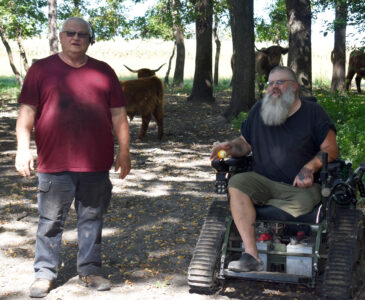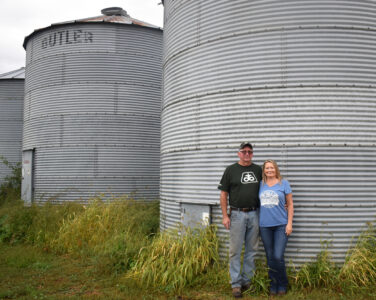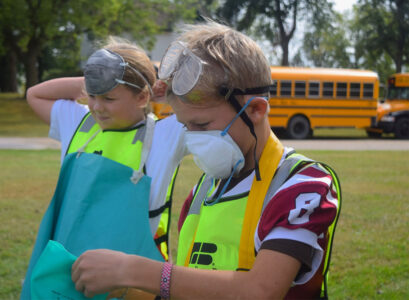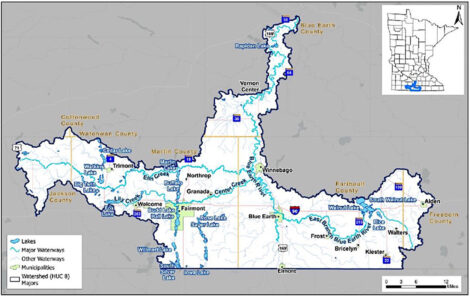Same acreage, 130 years
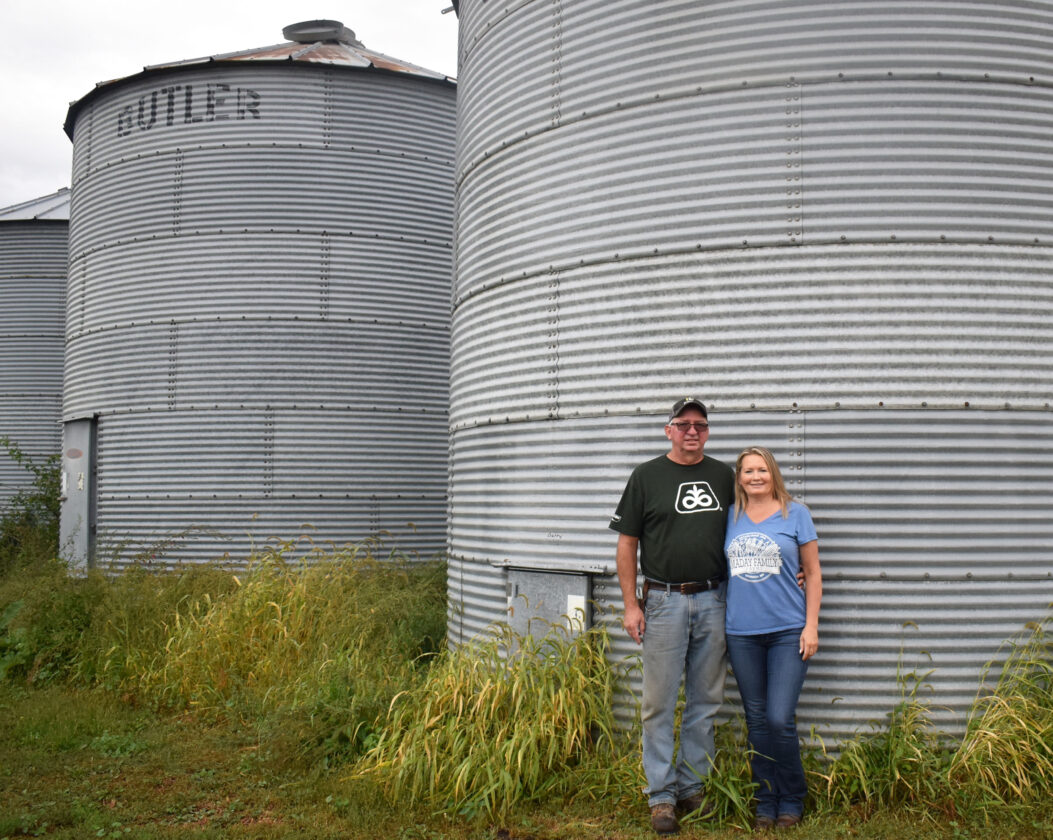
ABOVE: Darren and Tevi Maday stand in front of their grain silos, which have stood on their farm since the 1970s.
FAIRMONT – For 130 years, 80 acres outside of Fairmont has been the farm of the McNerney/Maday family.
The original homesteader’s father emigrated to America from Ireland. John McNerney left behind four kids after passing Nov. 11, 1879, leaving four kids. One of these, James McNerney, stayed in the Fairmont area. After marrying Anna Garry on Nov. 24, 1894, they purchased an 80-acre farm site from Peter and Christine Erickson for $ 1,800 on Dec. 7 of that year.
Three generations later, Darren Maday owns and operates the farm with his wife, Tevi Maday.
In a written family history, it notes that James McNerney was a clerk of Pleasant Prairie Township for many years and also served as clerk of School District #23 for a time.
“During WWI, he devoted a great deal of his time to patriotic activities by being chairman of the Liberty Bond Drives,” the written account states. “He and Anna were among the first leaders in Farm Bureau work. He was active in conservation work by keeping Lake Imogene stocked for good fishing. During the flu epidemic, Anna gave a helping hand to many families.”
It was also during this time James McNerney’s oldest son, John, served in the war. The letter contains the only information Darren and Tevi Maday can find about what was first grown on the farm.
“How was the wheat crop?” John McNerney asked in the letter. “I hope it was good, for although I am away over here on the other side of the water, I am eating Minneapolis flour, which certainly seems good.”
A story Darren Maday recalled was one his great aunt Mary Kelley told about a butter crock they had installed at the farmsite when the county was putting in a new road.
“She said that her dad, James, told the road foreman that if he put in a butter crock for him, his wife would make him fresh bread every morning,” Kelley recounted. “As a child, she would be sent out to the crock to get the cream and would always be cautioned not to spill the cream. This would cause bacteria to grow and risk putting a crack in the crock.”
When James died in 1927, Anna continued to own the farm with help from her children and their spouses. John McNerney married Margaret Wade around this time, and their daughter married Louis Maday. Taking his last name, it was Marvis and Louis Maday who took over the farm in 1954.
Darren Maday was the youngest of 17 children, born in 1968. He was still a child when the original farmhouse built in 1894, which by 1974 was unoccupied, was burned to the ground in an arson.
Taking over in 1988, Tevi Maday said she and Darren faced the same trials her step-parents had when they first took over.
“When Louie and Marvis were young and first starting out, the uncle didn’t want to sell them both parcels of land,” she said. “The challenge was they thought they were too young and couldn’t handle all that. We ran into the same thing when we were first getting started. We didn’t have a record proving our worth yet, getting financing and having someone to trust you enough to loan you the money.”
Currently, the Madays grow corn and soybeans. They also raised cattle, up to 100-150, until COVID had them pivot away.
“All the packing plants shut down,” Darren Maday said. “We couldn’t find a packer. Our feedlot needed a lot of work, and we just decided it was too much of a risk for too little reward.”
The McNerney/Maday farm was certified as a Century Farm in 2025. It was initially believed they had already been registered, but Tevi Maday discovered last year the status had never been applied for.
“I had called up to the State inquiring how I could get proof of our status, and they informed me that we had never applied,” she said. “I had wanted proof as we were wanting to make bourbon from our corn through Century Farms Distillery in Spencer, Iowa.”
Looking forward, Darren Maday said the ultimate goal is for the farm to stay in the family. They have three kids, and Tevi Maday said one of them is in farming currently, so they should be good for at least one generation.
“Hopefully our grandson will farm someday, but they get to make their own paths in life,” she said.
*Editor’s Note: This article ran in the Sentinel’s Sept. 23, 2025 Fall Ag section.

